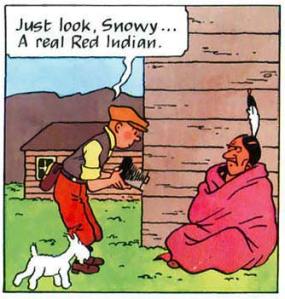This seems to be a recurring theme from generation to generation. Many people look back on their childhood fondly and use this nostalgic lens of what they thought of as normal to scrutinize what is going on with “kids these days.” As my classmate Andres stated this week:
Often these concerns have to do with the media that children and young adults are consuming and the impact that it may have on them. Of course, I look back at my childhood with nostalgia, remembering the toys I played with, the shows I watched and the games I played. However, when I look at some of these things as a critical adult, I would hesitate to suggest that they are great material for a kid. I loved watching Looney Toons, the Ninja Turtles and the Adventures of Tintin and I took out every Asterix comic from the library on multiple occasions. These were all overtly violent, racist, sexist and full of offensive stereotypes — things that I was oblivious to as a child.
I’m not sure, however, that any of these shows that I watched, or books I read were given all that much attention. In fact, I think that my mom tried to prevent me from viewing some of the shows that she thought were problematic — The Simpsons (“too offensive! he might get ideas!”) or Beetlejuice (“well, that’s just gross”). I remember concern from my parents about the potential negative impacts of seeing these shows or playing violent video games, etc. Regardless, my point here is that some parents had concerns about the media that their children were consuming then, just as they do now. However, kids, myself included were still exposed to them and turned out ok.
The concern we discussed this week was social media and whether it is ruining childhood and making kids grow up too fast by exposing them to vulgar, graphic and pornographic content, lifting the floodgates for offensive ideas and language providing a platform for bullying and manipulation.
The group that argued the agree side of the debate — suggesting that technology is ruining childhood — made a point about the negative impacts of social media on mental health of children and youth, looking at the article “Social Media Affects Child Mental Health Through Increased Stress, Sleep Deprivation, Cyberbullying, Experts Say.” This got me wondering about the impacts that social media has on the prevalence of self-harm among young people today and led me to look at article such as “Social Media is Redefining ‘Depression’.” It suggests that “exhibitionism of self-harm, suicide, depression, or self-loathing under the pretext that it is beautiful, romantic, or deep is hardly unusual,” and in it’s discussion of online communities based around these ideas suggests that “for a fragile mind, these communities seem to provide the perfect solution: support, understanding, acceptance. To be accepted by this community, they have to advertise their suffering.” This negative side to social media really worries me. It definitely is an example of some of the darker sides of the internet.
I also took a look at another resource mentioned in the group chat last week, CBC’s Sext Up Kids, a documentary that discusses the sexualization of teens and young girls in mainstream media and the impacts of readily available pornography on youth. This too, got me worrying about the impacts of social media and technology on young people.
However, despite some of these strong arguments about the negative impacts of social media on our youth, I am not convinced that it is destroying childhood.
Are these all realities of the internet and social media? Yes. Do kids deal with some things that we did not when we were children? Yes. But is it ruining childhood? I don’t think that it is. Students have resilience — they are born into a digital world now. They are exposed it and they learn to deal with it. This is their reality and they are much more comfortable with it and able to navigate it than many adults assume or give them credit for. That being said, the teaching of digital literacy and digital citizenship for our students is of utmost importance for helping them navigate this digital world safely — even though there is a lot that they could probably teach us about it.
Is there a place for breaks from technology and social media? Would there be benefit to kids spending more time offline, face to face and outside? Maybe — there is plenty of research and writing to indicate this(check out, the Last Child in the Woods and the idea of Nature Deficit Disorder). Maybe we just need to make sure that there is a balance.


Great post man! I love the point you made about how a lot of the media we watched or viewed as kids was definitely questionable. I TOO was not allowed to watch the Simpsons as a child because my parents deemed it too offensive. The funny thing is, I’d watch “Ren and Stimpy” all the time, which was arguably much worse and yet, no one said anything. I don’t want to stray away from the topic at hand, but exactly like you said, we were exposed to a lot of similar things growing up, and we definitely grew up to be alright human beings. I guess now the amount of things they are seeing have multiplied exponentially, and it’s a little closer to their reach.
LikeLike
I wonder if it was because the Simpsons would have been in the media more so parents may have been more aware of it. I remember my mom telling me about she had a conversation with a teacher at my school in the early 90s about how worried he was about the Simpsons and how the disrespect that Bart had for teachers, saying such horrific things as “eat my shorts,” could be a a terrible influence on kids.
The funny thing is, eventually she got super into the Simpsons.
LikeLiked by 1 person
That’s really funny. Yeah, it definitely had something to do with how much media coverage it had, same with South Park (mind you South Park was always intended for adult audiences). My mom came into my room one time when I was in grade four and watched the Simpsons with me. She had a clipboard with her and was writing down everything while we watched. I remember the particular episode was on fire and was more offensive than usual. My thought while sitting there we’re sinking in: “that’s it… This is the last time I’ll ever watch this show”. To me, I don’t even think it was as much as my parents didn’t want me watching it, as it was them doing that and making it totally uncool for me. Either way, it sort of worked I guess Hahahha
LikeLike
I love how you point our that children are resilient. My husband teaches grade 7/8 and I know that this is one of his major ELA themes throughout the year. These discussions about engaging with social media could be part of large discussions on resilience. Great thoughts Ian!
LikeLike
I agree that each generation has probably been exposed to media that might be considered inappropriate. I also strongly agree that we are always so quick to blame someone or something else. When do we start taking responsibility and step in to start making changes (if there is in fact such a problem)? I don’t think there are too many places that we can take a break from technology without choosing to. Very few places have restrictions on cell phone use. In order to remove ourselves and step away from it we need to make a choice to do it. We need to put down our phones and step away from our screens. That’s the only way we can find balance. Thanks for sharing Ian!
LikeLike
I love your perspective on this post! I think you are very right in the fact that maybe we need to give our kids more credit than we do. Sometimes as a parent I find myself surprised by the things that my 3 year old can do when I can’t run to her rescue. I guess there’s something to be gained by letting children fend for themselves to an extent as well! Great post! Thanks Ian!
LikeLike
Well said! I agree we need to help students become strong digital citizens who are willing to engage and step into their futures. I think students are resilient but it’s an area where we can also help them learn strategies to become more resilient. In an unknown future, being a resilient, critical thinker will give them the best chances at learning, unlearning and relearning.
LikeLike
Pingback: Can We Fight the Future? | Braun Bytes